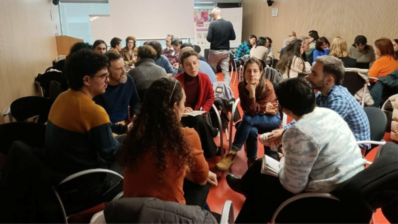Eva Novoa, Renée Beekman and Lars Velten from the Centre for Genomic Regulation (CRG) together with Kristina Haase from the European Molecular Biology Laboratory – Barcelona (EMBL Barcelona) are four of the 397 young researchers awarded with the European Research Council (ERC) Starting Grants. With these grants they will be able to launch their research in blood-forming systems, reproduction, cancer and coronary microvascular diseases, respectively.
ERC Starting grants aim to help young researchers launch their own projects and pursue innovative ideas. To this end, each award-winning researcher will receive €1.5 M to fund up to five years of outstanding research.
A glance to the awarded projects
- Eva Novoa, Group Leader of the Epitranscriptomics and RNA Dynamics lab at the CRG will sequence the RNA of sperm cells to study how sperm RNA may affect the metabolism of future generations. They expect to understand how dietary information gets converted into changes in sperm RNA and identify the RNA diversity among individual sperm cells.
- Renée Beekman, Group Leader of the Single Cell Epigenomics and Cancer Development lab at the CRG, CNAG-CRG & IDIBAPS will study the impact of translocations on the early stages of non-Hodgkin lymphoma. They expect to develop a system to obtain new insights on how tumor is initiated and identify new vulnerabilities in the disease.
- Lars Velten, Group Leader of the Single Cell Genomics of Tissue Regeneration lab at the CRG aims to create new models of gene regulation in the human blood-forming system by combining the results of single cell screenings with artificial intelligence. With this approach they expect to better understand the behavior of blood stem cells. A knowledge that, hopefully, could be used to synthetically generate these cells.
- Finally, Kristina Haase, Goup Leader of the Engineering vascularised tissue-specific disease models at EMBL Barcelona will investigate Coronary Microvascular Disease, a contributing factor to ischemic heart disease. With her team, they will develop a 3D vascularized cardiac model on a chip to study how several risk factors, including ischemia, diabetes, and sex-specific hormones, contribute to coronary microvessel dysfunction.
The importance of resilience
ERC Starting Grants are among the most competitive calls and have a low rate of success, 13.3% in 2020. That is why many researchers have to apply for the call several times.
In this sense, it is remarkable this tweet from Eva Novoa encouraging those less fortunated. Because success is not the rule in science, but often the exception.
So, congratulations to the awarded researchers, and good luck and support to all other candidates!







